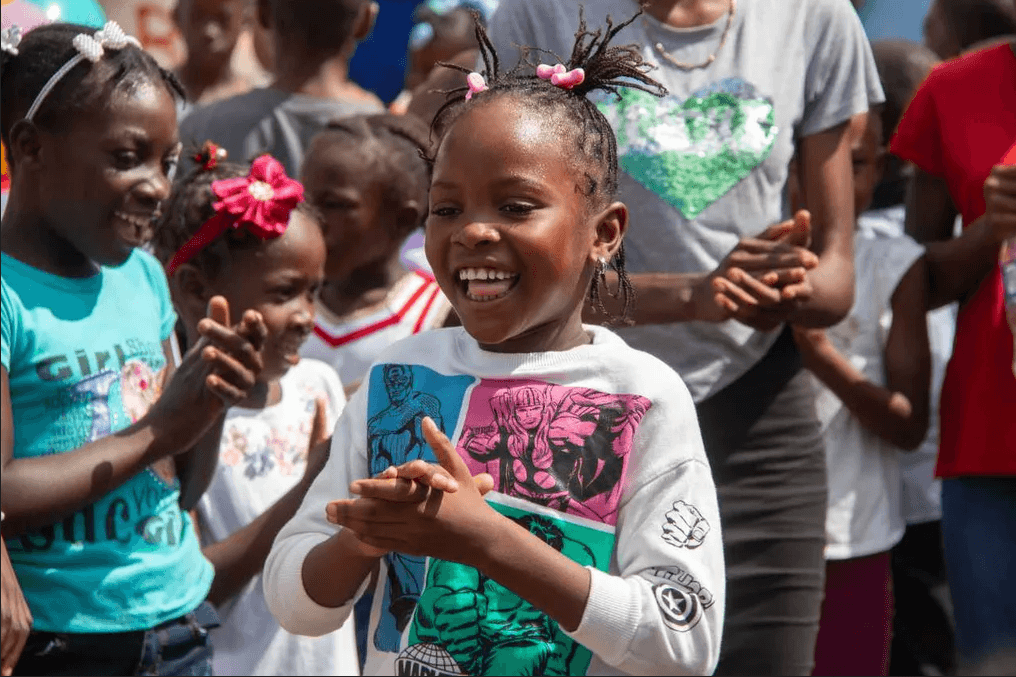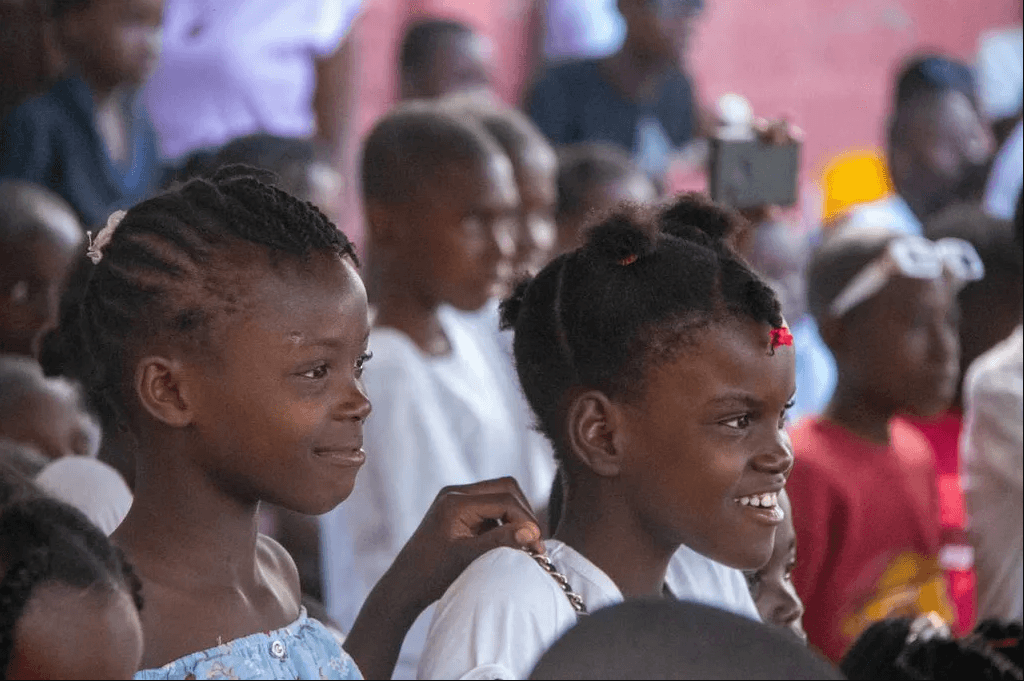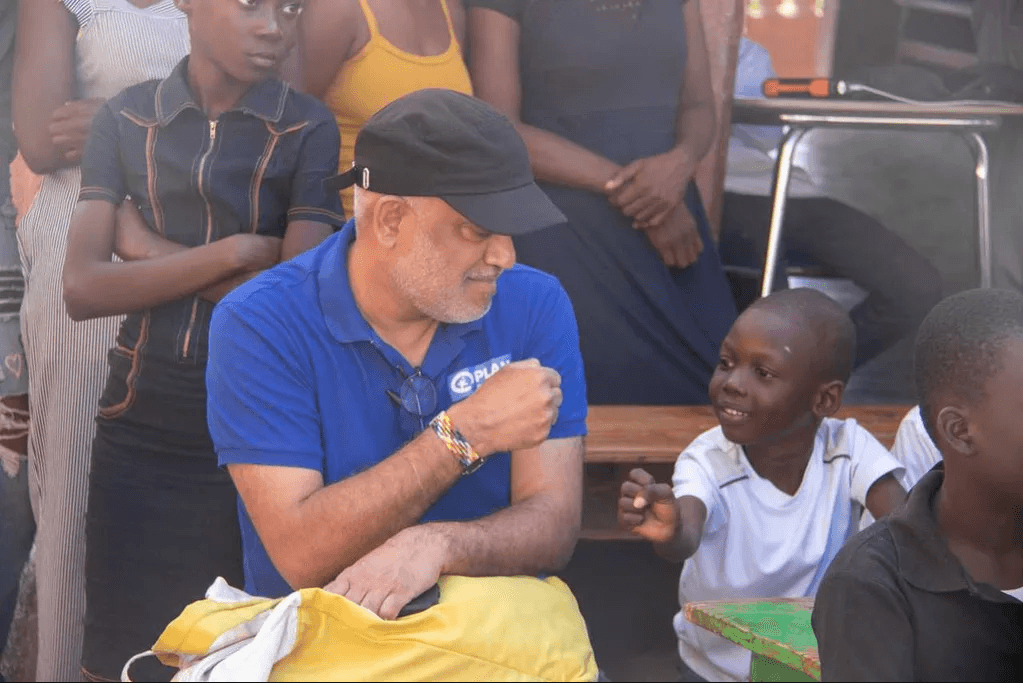European Humanitarian Forum should shine a spotlight on children in forgotten crises
17 March 2024The European Humanitarian Forum needs to be a space that builds towards a new paradigm, one rooted in compassion, solidarity and humanitarian principles, argues Dr Unni Krishnan, Plan International Global Humanitarian Director.

A young girl smiling and clapping during an activity in a child-friendly space, Haiti, 2024. © Plan International
A few days ago, amidst the chaos and despair in Haiti, I met Sylvie* (13) in a child friendly space run by local volunteers and Plan International. In the relative comfort of this protected space where children are engaged in play, music, education and recreational activities, Sylvie’s desires resemble those of countless of children in conflict, disasters and other humanitarian settings. She yearns for the end of violence and for her school doors to reopen. Is this too much to ask?
Despite the fast deteriorating situation, Haiti struggles for attention in global news cycles. This is important because, with notable exceptions, the harsh rule remains that less media coverage about a humanitarian crisis means less support. Some disasters capture headlines and elicit immediate responses while others languish in obscurity, with victims forgotten and suffering overlooked.
Forgotten children in forgotten crises
How can we accept that cries of survivors are rendered invisible by the clamour of competing news stories?
I witness the plight of Sylvie and I cannot help but question our world’s priorities. How can we accept that cries of survivors are rendered invisible by the clamour of competing news stories? How is it that the needs of those most in-need, like children or girls, remain side-lined in the face of indifference?
Humanitarian agencies grapple with donor and media fatigue, and dwindling resources, resulting in essential children services like education and protection falling through the cracks. In a world where 110 million people are forcefully displaced primarily by wars, conflicts and disasters, 43 million of whom are children, the ones in most vulnerable situations are often the least prioritised.
We witness this time after time, with Gaza, Sudan, Ukraine, Rohingya refugee camps, Venezuelan migrants and refugees in the Darién Gap, and more.
Facts paint a grim picture. This year, just 1.0% of the funds needed to provide protection for children in crisis are available, with 3% allocated for education in emergencies (Financial Tracking Service, OCHA). Sylvie’s dream to live peacefully and be able to go to school is emblematic of the millions whose lives are upended by forces beyond their control.

European Humanitarian Forum: progress or empty exercise?
The European Humanitarian Forum needs to be a space that builds towards a new paradigm, one rooted in compassion, solidarity and humanitarian principles. Attending participants must advocate for a European Union that prioritises global solidarity built on values and a long-term vision.
Child protection is inseparable from International Humanitarian Law, whereas infrastructure like hospitals and schools can be safe spaces for children.
This must start with a collective agreement that no child is neglected in the face of adversity as the bare minimum. Our leaders must take strong political, humanitarian and diplomatic action to address urgent needs.
The revision of the EU Guidelines on Children and Armed Conflict is a step to that end. The EU must champion the prevention and eradication of all grave violations against children in conflict, and ensure long-term funding for programmes supporting children and girls in conflict situations, such as reintegration programmes for children associated with armed forces and armed groups.
Child protection is inseparable from International Humanitarian Law, whereas infrastructure like hospitals and schools can be safe spaces for children. Governments should pursue accountability for anyone targeting schools, hospitals and attack on children and abduction girls and detention of children, to push for all parties to conflict to fulfil their obligations under international law.
Leaders must also create spaces for children and young people to co-design solutions. The forum has taken a step to the right direction by welcoming child and young advocates. We look forward to listening to the real-life experiences and testimonies of a 14-year-old girl from Sudan and a 24-year-old young woman from Uganda, both members of Plan International’s delegation, when they address high-level panels. We, of course, expect transparency as to how interventions of all participating advocates are followed-up.
Where are children in the super-election year?
The world I would like to live in is a world that is compassionate, just and peaceful. Rejecting such a world as fantasy arises from lack of imagination. We all can and need to contribute, in ways big and small.
As a humanitarian worker who works often on the frontlines of crisis settings, I am amazed by the resilience of children. For the world to recognise their needs and dreams, we need a change in mindsets.

This super-election year, 60 countries have national elections, with some calling this a “universal adult festival.” Children are largely missing from election discussions. While each election is different, political parties across the board recognise that support of their constituencies is crucial to influence voters. This often leads to an emphasis of very narrow and selective commitments which prevent us from collectively assessing what world we want to live in.
The world I would like to live in is a world that is compassionate, just and peaceful. Rejecting such a world as fantasy arises from lack of imagination. We all can and need to contribute, in ways big and small.
Hundreds of changes are needed, and the concrete steps taken on occasions like the EHF are only the beginning. Our ambition must be bold. To bring lasting changes, putting children at the heart of decisions that impact them is key. To that end, I believe granting children the right to vote is necessary. This would not only affirm their status as active members of our society, but also serve as a catalyst for prioritising their needs in humanitarian crises. It would amplify their voices, protect their rights, and lay the groundwork for a more just and inclusive future.
Is it not a myth that children don’t vote? In reality, every child dying from hunger, war, or preventable diseases is a vote of non-confidence against humanity. It is time to change.
—
* name changed.


